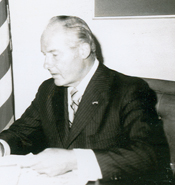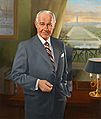Robert H. Michel facts for kids
Quick facts for kids
Bob Michel
|
|
|---|---|
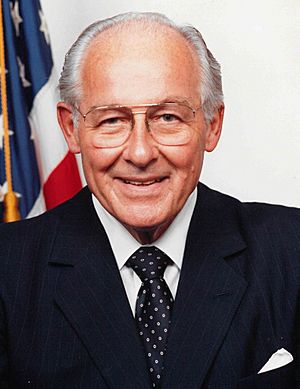 |
|
| House Minority Leader | |
| In office January 3, 1981 – January 3, 1995 |
|
| Preceded by | John Rhodes |
| Succeeded by | Dick Gephardt |
| Leader of the House Republican Conference | |
| In office January 3, 1981 – January 3, 1995 |
|
| Preceded by | John Rhodes |
| Succeeded by | Newt Gingrich |
| House Minority Whip | |
| In office January 3, 1975 – January 3, 1981 |
|
| Leader | John Rhodes |
| Preceded by | Leslie C. Arends |
| Succeeded by | Trent Lott |
| Member of the U.S. House of Representatives from Illinois's 18th district |
|
| In office January 3, 1957 – January 3, 1995 |
|
| Preceded by | Harold H. Velde |
| Succeeded by | Ray LaHood |
| Personal details | |
| Born |
Robert Henry Michel
March 2, 1923 Peoria, Illinois, U.S. |
| Died | February 17, 2017 (aged 93) Arlington, Virginia, U.S. |
| Political party | Republican |
| Spouse |
Corinne Woodruff
(m. 1948; died 2003) |
| Children | 4 |
| Education | Bradley University (BS) |
| Military service | |
| Allegiance | |
| Branch/service | |
| Years of service | 1943–1946 |
| Rank | Private |
| Unit | 39th Infantry Regiment |
| Battles/wars | World War II |
| Awards | Bronze Star Medal (2) Purple Heart with battle stars (4) |
Robert Henry Michel (March 2, 1923 – February 17, 2017) was an American politician. He was a member of the Republican Party. Michel served in the United States House of Representatives for 38 years. He represented the 18th congressional district of central Illinois. He was the leader of the Republican Party in the House. He served as House Minority Leader during his last 14 years in Congress (1981–1995).
Michel's time as a leader happened when the Democratic Party had the most members in the House. He was known for working well with both parties. He was friends with important Democrats in the House. Later, other younger Republicans, like Newt Gingrich, wanted a tougher style of politics. Michel did not run for re-election in 1994. In those elections, Gingrich led the "Republican Revolution." This led to the Republican Party taking control of the House for the first time in 40 years.
Contents
Early Life and Education
Robert Henry Michel was born and grew up in Peoria, Illinois. His father was an immigrant from Alsace, a region in France. His mother's parents were immigrants from Germany. He went to Peoria High School. He later earned a Bachelor of Science degree from Bradley University.
Military Service in World War II
When the U.S. joined World War II, Michel joined the United States Army. He served as an infantry soldier with the 39th Infantry Regiment. He fought in England, France, Belgium, and Germany. He was part of the Invasion of Normandy in 1944. During his service, he was wounded by machine gun fire. He received two Bronze Stars and the Purple Heart. He also earned four battle stars for his bravery.
Starting His Career in Politics
After World War II ended, Michel went back to Bradley University. He graduated in 1948. From 1949 to 1956, he worked for U.S. Representative Harold Velde. He was Velde's administrative assistant. This job helped him learn how Congress worked.
Serving in Congress
Michel was elected to the U.S. House of Representatives in 1956. He served there until he retired on January 3, 1995. Even though his party was never the majority, he was known for working with both sides. He was respected by Democrats, including Speaker Thomas "Tip" O'Neill.
Michel served as Minority Whip from 1975 to 1981. A Whip helps make sure party members vote together. From 1959 to 1980, he was on the House Appropriations Committee. This committee decides how the government spends money. Later, he became House Minority Leader from 1981 to 1995.
Important Votes and Policies
Michel voted for important laws that helped ensure equal rights. These included the Civil Rights Act of 1957, Civil Rights Act of 1960, Civil Rights Act of 1964, and Civil Rights Act of 1968. He also voted for the 24th Amendment, which banned poll taxes. He supported the Voting Rights Act of 1965, which protected the right to vote for all citizens.
In 1983, Michel voted for the bill that made Martin Luther King Jr. Day a federal holiday. This was an important step in honoring Dr. King's legacy.
Challenges and Changing Styles
Michel's toughest re-election race was in 1982. This was because people were unhappy with President Ronald Reagan's economic plans. President Reagan even traveled to Peoria to help Michel's campaign.
In the early 1990s, some younger, more conservative members of Congress, like Newt Gingrich, criticized Michel. They felt he was too willing to compromise with Democrats. Michel believed that working with Democrats, even playing golf or cards with them, helped get laws passed. His supporters said his approach led to good deals. It was also noted that Michel's voting record was very conservative, similar to Gingrich's.
In 1990, President George H. W. Bush worked with Congress to reduce the national debt. This plan included some tax increases. Gingrich led a group that opposed this plan. This disagreement led to a brief 1990 United States federal government shutdown. Michel was not happy with Gingrich's actions.
In 1993, Michel gave the Republican response to President Bill Clinton's first State of the Union speech. He criticized Clinton's economic plans. He said that words like "investment" and "patriotism" were being used differently by the new administration.
Retirement from Congress
Because of Gingrich's growing influence, Michel decided not to run for re-election in 1994. If he had run and won, he would have served in a Republican-controlled House for the first time. However, Gingrich would likely have become Speaker of the House. When he announced his retirement, Michel said that some of his fellow members of Congress were more interested in fighting than in passing laws. Gingrich's style was more confrontational, while Michel preferred working together.
Michel was replaced in Congress by his longtime chief of staff, Ray LaHood. Years later, LaHood praised Michel. He said Michel "knew warfare first hand." This meant Michel understood real conflict. Because of this, he never used harsh words like "warfare" when talking about politics. LaHood said Michel believed that harsh, personal talk had no place in politics.
Honors and Legacy
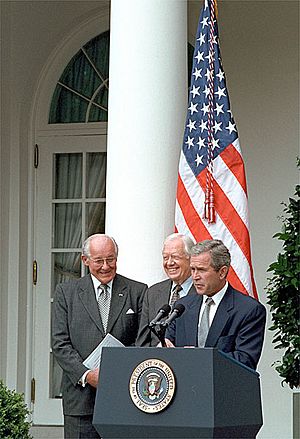
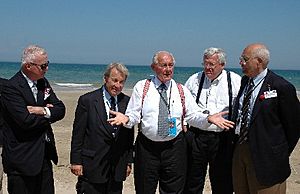
Michel received many awards for his public service. In 1989, President Ronald Reagan gave him the Presidential Citizens Medal. In 1994, President Bill Clinton awarded him the Presidential Medal of Freedom. This is the highest award a civilian can receive in the United States. In 2000, he received the first Congressional Distinguished Service Award.
Michel was also a good baseball player. In the 1960s, he often won as a pitcher in the annual United States Congressional Baseball Game. In 1993, a Capitol Hill newspaper put him in its Baseball Hall of Fame.
In 2010, he received the Schachman Award. This was for his work after Congress to support the National Institutes of Health. His efforts helped double the NIH's budget, which funds important medical research.
Several places and awards are named after Robert H. Michel:
- The Bob Michel Bridge in Peoria, Illinois.
- The Robert H. Michel Student Center at Bradley University.
- The Robert H. Michel Rooms in the United States Capitol, where the Speaker's offices are.
- The Bob Michel Community Based Outpatient Clinic in Peoria, a VA Clinic.
- The Robert H. Michel Lifetime Achievement Award, given for community leadership.
In 1997, Robert H. Michel was given the Order of Lincoln. This is the highest honor from the State of Illinois.
Personal Life
Michel was married to Corinne Woodruff from 1948 until she passed away in 2003. They had four children: Scott, Bruce, Robin, and Laurie.
Michel passed away on February 17, 2017. He was 93 years old. He died from pneumonia in Arlington, Virginia.
Images for kids
-
President George H. W. Bush eating lunch at the White House with Michel and Bob Dole in 1991
-
President Ronald Reagan meets with Michel, Bob Dole and Alan Simpson in the cabinet room in 1985


